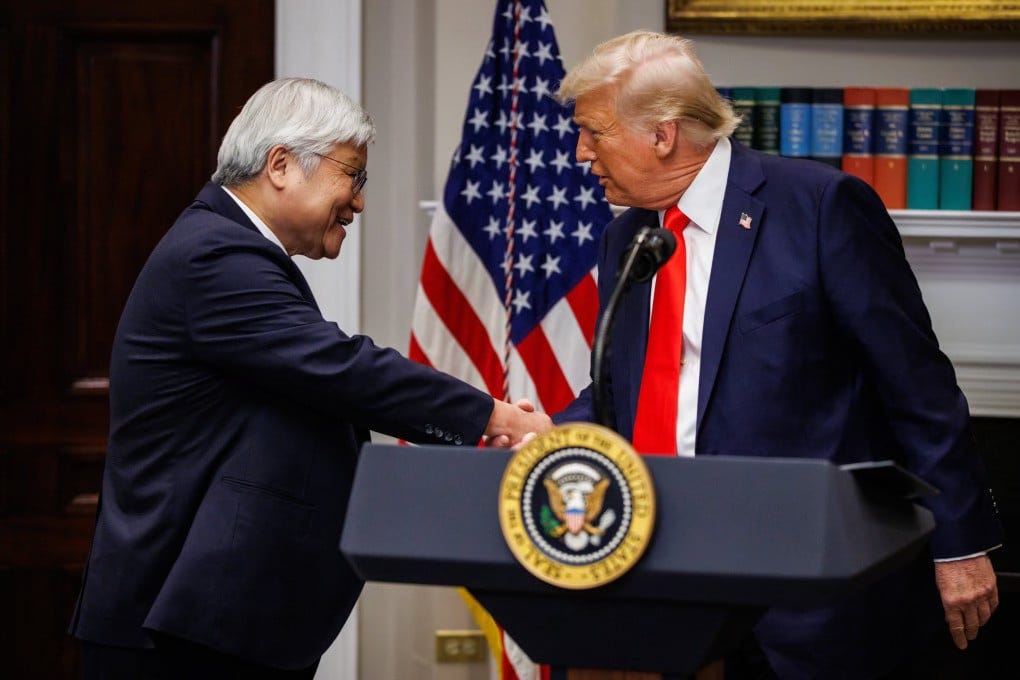Taiwan’s “Silicon Shield” Caught in Geopolitics
TSMC's new U.S. investment raised concerns about the future of Taiwan's "silicon shield".
When C.C. Wei, chief executive for Taiwan Semiconductor Manufacturing Co (TSMC), stood alongside President Donald Trump at the White House on March 3 to announce a USD 100 billion investment to produce advanced chips on U.S. soil, government officials in both Beijing and Taipei were seemingly caught off guard.
TSMC’s investment pledge, the largest yet by a foreign chipmaker in the United States, is driven by geopolitics. Despite challenges building its first plant in Arizona, the company’s decision to invest more in America, in obvious alignment with President Trump’s onshoring priorities, appears to be in the best interest of its shareholders.
But TSMC's new U.S. investment has also raised concerns about the future of Taiwan's "silicon shield"—the idea that Taiwan’s critical role in global semiconductor supply chains means that China cannot afford to destabilize Taiwan. The move also casts doubts on Taiwan’s ability to maintain its competitive edge over the long term.
On the campaign trail and since returning to the White House, Trump has threatened Taiwan, traditionally considered a strong partner of the United States, with the possibility of high tariffs on Taiwan chip products. He has accused Taiwan of "stealing" the U.S. chip industry, but at the same time has praised TSMC as a model for others to emulate. Amid such opposing messages, Wei has decided to follow a playbook previously set by Elon Musk and his Tesla empire – in Musk’s case, playing to political realities in both China and the United States.
In late 2019, Musk established Tesla's Shanghai factory, which later become the company’s largest manufacturing base. Roughly half of the vehicles produced there are sold in China, while the rest are exported to markets other than the United States. This strategy allowed Musk—now Trump’s ally in the White House—to expand in the China market, while not trying to challenge U.S. barriers keeping out China-made vehicles.
Shortly after TSMC's USD 100 billion investment announcement, Beijing cautioned the company against turning into "ASMC"—the "American Semiconductor Manufacturing Company." Meanwhile, President Lai in Taipei reassured his public that TSMC had informed him of the deal in advance, urging them not to worry about the United States “gaining control” over Taiwan's most valuable asset. However, political criticism emerged after Taiwan’s Economic Minister J.W. Kuo admitted in a local interview that the government had not, in fact, been notified beforehand—contradicting Lai’s earlier statement.
The reality is that TSMC felt significant pressure to act quickly, opting to expand its U.S. investments in an attempt to sidestep Trump’s tariff threats. Trump, in turn, saw the deal as a victory, and will now use it to pressure smaller chipmakers to follow TSMC’s lead. Some industry insiders now privately suggest that TSMC sacrificed others to shield itself.
TSMC CEO C.C. Wei appeared to carefully navigate geopolitical sensitivities by keeping President Lai and his cabinet out of negotiations with the Trump administration, trying to fend off criticism that his move was politically motivated rather than a strategic supply chain diversification.
Still, it is an unescapable fact that TSMC’s decision was deeply political, shaped by the complex geopolitical dynamics between the United States, China, and Taiwan—the world's most critical "small triangle" relationship.
In today’s world, pleasing all stakeholders is nearly impossible. TSMC prioritized shareholders' interests—an understandable decision—but its move caught both Beijing and Taipei off guard and may have inadvertently made Taiwan appear more vulnerable.
(Author’s note: This analysis was originally written for The Asia Group’s “Pixel Politics” newsletter, published on March 14, 2025)





I think a lot about this. Thanks for the article.